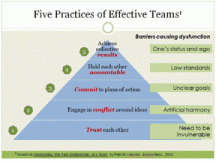Last week our Parish Staff listened to an on-line “webinar” entitled, “Leaning On The Gifts And Talents Of Others - 6 Things Pastors Do To Kill Church Growth.” In the light of the recent discussion and publication of a St. Monica Parish Vision,” the staff thought that the topic was germane and timely.
The webinar was provided by Jerry Lawson,  Pastor of Daystar Church in Alabama. In his research, Jerry Lawson has ascertained the following information about churches in the US:
Pastor of Daystar Church in Alabama. In his research, Jerry Lawson has ascertained the following information about churches in the US:
- 86% - are declining.
- 6-7% - are flat.
- 7% - are growing.
Over the past several years, Pastor Jerry has tapped into a set of ideas and practices that helped him grow his church community is significant ways. Recently he, and his team, felt that the Lord was calling them to help them mentor other pastors and assist other churches to do the same. To this end they sponsor their Daystar Church media outreach as well as 24-To-Double, the program aimed as helping churches to grow.
Our St. Monica Parish Staff found the webinar interesting as well as encouraging especially since several ideas presented by 24-To-Double are several activities already happening - or being planned - at St. Monica. So what did Pastor Jerry mention?
MISTAKE #1 - Using Positive Reinforcement As A Guide.
If your church is in category one or two above, and you continue to receive positive reinforcement from your congregation - that’s bad! All that is doing in reinforcing bad behavior, avoiding the acknowledgement of real issues and problems that need to be addressed and putting off the inevitable need to engage in the actions to reverse the situation. Let me give you an example from “Catholic Church life.” I can’t tell you how many times I have heard people complain about a priest’s homily (and to be fair, more often than not, they’re right). Yet when they greet “Father” after church, what do they say, “Great homily Father.” Why would he change?
In his book, The 5 Dysfun ctions of Teams, Catholic consultant Patrick Lencioni says that the first step to effective leadership is Building Trust. The SECOND step is Mastering Conflict: “When trust is present, teams are able to engage in unfiltered ideological debate around ideas, issues and decisions that must be made.” That’s what this idea is about.
ctions of Teams, Catholic consultant Patrick Lencioni says that the first step to effective leadership is Building Trust. The SECOND step is Mastering Conflict: “When trust is present, teams are able to engage in unfiltered ideological debate around ideas, issues and decisions that must be made.” That’s what this idea is about.
The process to be honest will be painful and the pain comes up front. Change i s not seen (Only LATER will you see the fruit). People will complain, people will leave. The people who got the parish where it is today won’t take the parish to where God wants it to go. But the benefits of following the vision far outweigh the costs.
s not seen (Only LATER will you see the fruit). People will complain, people will leave. The people who got the parish where it is today won’t take the parish to where God wants it to go. But the benefits of following the vision far outweigh the costs.
By the way, speaking of “great homilies” as the key to parish growth, studies show that a priest can’t preach a parish into impacting the community. It takes much more than that.
 MISTAKE #2 - Reinventing the wheel.
MISTAKE #2 - Reinventing the wheel.
There are a lot of “church growth - church leadership” models out there. Many of them are quite good. In addition, parishioners have ideas - LOTS of them! LOTS of people will propose LOTS of great, new programs, initiatives, ministries, etc…. But a parish cannot just copy other churches. A parish cannot just take pieces from this church model and something from that church model and expect it to work in its own parish. And simply “‘throwing ideas out there, trying new stuff and looking to see what works, in NOT effective (or economical) leadership. Yes, parishioners and parish staff and parish leaders need to go to seminars, visit other successful churches, learn from them but the parish needs to stay true to its own vision. Our parish is unique. We need to determine what we want to do. Parishioners need to trust and listen to parish leadership, parish staff and parish “mentors” in order to keep the parish focused, centered and on target.
This means that the Pastor and parish leadership needs to “get, and keep, a filter on.” What we say “no” to is more important than what we say “yes” to.
MISTAKE #3 - Too Many People “Doing Favors.” (One of my two personal favorites btw)
Serving and ministry is NOT doing favors so please, “don’t do me any ‘favors.’ Don’t do the parish any ‘favors'” Here’s the formula we want:
Your passion + your spiritual gift = Your mission/your destiny.
If you aren’t passionate about what you do for, and at, St. Monica - please don’t do it. However, if you have a gift for hospitality, be a greeter. If you like young people, offer to teach Religious Education. This is one of the reasons why we’re going to invite the Catherine of Siena Institute to our parish in October for the “Called and Gifted” workshop/retreat. We need to find out what our gifts/charism are (or are NOT). Combine talent with a passion and we have a parish with disciples (not volunteers) operating under the “Spiritual Destiny” model and not under the “Desperate Volunteer” model.
MISTAKE #4 - No Quantifiable Goals.
Pastor Jerry says: “Good vision leeks.” Pastor Rick Warren (Purpose Driven Life & Purpose Driven Church) says: “People need clarity. Restate the vision every 30 days.” What gets measured, gets done.
This can lead to ministry growth which leads to staff growth, especially from within. Hopefully we will find people who are so good and so committed in a ministry that it becomes so fruitful that we have to eventually hire them.
MISTAKE #5 - You Doubt What God Can Do Through You. 
Problem #1 - When leaders take themselves seriously.
Problem #2 - When leaders DON’T take themselves seriously.
God can do HUGH things through the Pastor, the ministry, each parish group/organization, our parish. Thinking small is dangerous. Develop your faith muscles. You can’t think big enough because God wants to take you to an even BIGGER place.
MISTAKE #6 - Trying To Do It All or Thinking That The Pastor Can/Should Do It All. (My other personal favorite)
Pastor, author, speaker and motivational speaker John Maxwell says, “Great leaders walk slowly through the crowd.” The formula for keeping your church small is for the priest to do everything or to constantly go to the Pastor with LOTS of good ideas (“Mistake #2” above) … and then go away. We don’t need lots of “do-ers.” We need leaders who commission others, who empower others, who train others, who bring others to Jesus. In others words,
- we need “non-actives” to become “active;”
- we need “actives” to become “disciples;”
- we need “disciples” to become “apostles.”
- We need “apostles” who, in turn, make other “disciples.”
Don’t say, “Father we should….” or “Father you need to….” I know that already. You model it - you partner it - you nurture it, you watch it grow and being done. And this doesn’t necessarily mean a huge investment of time. In the webinar, Jerry Lawson referenced the book, The Four Hour Workweek (http://fourhourworkweek.com). A lot can be done in small amounts of time.
****************
In his 2005 message to the youth of the world, Pope Benedict XVI  posed the following questions:
posed the following questions:
“Where do I find standards to live by, what are the criteria that govern responsible cooperation in building the present and the future of our world? On whom can I rely? To whom shall I entrust myself? Where is the One who can offer me the response capable of satisfying my heart’s deepest desires?”… Let yourselves be surprised by Christ!” (World Youth Day message from Pope Benedict XVI, Cologne, Germany, 2005)
Let’s see what can happen when we give “God permission to surprise us”.